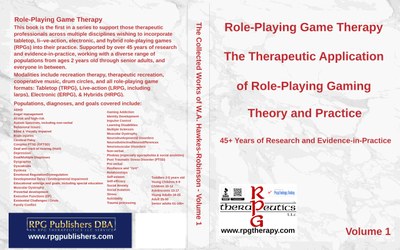UPCOMING PUBLICATION NOVEMBER 2023: 4th Edition: A Handbook for Role-Playing Game Therapy And The Therapeutic Application of Role-Playing Gaming Volume 1: A Guide for Professionals Supported by 45+ Years of Evidence-in-PracticeHandbook of Practice

Hardcover Edition: $149.95
Softcover (paperback): $99.95
Publication Release Date: ~November 2023.
Details:
This book is part of a series that supports those therapeutic professionals across multiple disciplines wishing to incorporate tabletop (TRPG), live-action (LRPG), electronic (ERPG), and/or hybrid (HRPG) role-playing games (RPGs) into their practice. Supported by over 45 years of research and evidence-in-practice, working with a diverse range of populations from ages 2 years old through senior adults & everyone in between.
Includes research, theories, aggregate anonymized case studies, and specific program examples to help guide professionals in the trials, tribulations, and triumphs with a wide range of populations, using role-playing games as an intervention modality to achieve specific observable and measurable results with patients and clients.
Populations
Populations, diagnoses, & goals covered throughout this series include:
Toddlers 2-5 years old
Young Children 6-9
Children 10-12
Adolescents 13-17
Young Adults 18-25
Adult 25-60
Senior adults
ADHD
Anger management
At-risk and high-risk
Autism Spectrum, including non-verbal
Behavioral Issues
Blind & Visually Impaired
Brain injuries
Cerebral Palsy
Complex PTSD (CPTSD)
Deaf and Hard of Hearing (HoH)
Depression
Dual/Multiple Diagnoses
Dysgraphia
Dyscalculia
Dyslexia
Emotional Regulation/Dysregulation
Developmental Delay / Developmental Impairment
Educational settings and goals, including special education
Muscular Dystrophy
Preverbal development
Executive Functions (EF)
Existential Challenges / Crisis
Family Conflict
Gaming Addiction
Identity Development
Impulse Control
Learning Disabilities
Multiple Sclerosis
Muscular Dystrophy
Neurodevelopmental Disorders
Neurodistinctive/Neurodifferences
Neuromuscular Disorders
Non-verbal
Phobias, fear, and anxiety (especially agoraphobia & social anxieties)
Post Traumatic Stress Disorder (PTSD)
Pre-verbal
Resilience and "Grit"
Relationships
Self-esteem
Self-efficacy
Social Anxiety
Social Isolation
Stress
Suicidality
Trauma processing
Related Publications
Also see the related books:
The Collected Works of W.A. Hawkes-Robinson
The Collected Works of RPG Research
The Certified Role-Playing Game Professional Study Guide
The Role-Playing Game Professional Workbook
A Handbook For Professionals Using Role-Playing Games to Achieve Recreational Goals
A Handbook For Professionals Using Role-Playing Games to Achieve Entertainment Goals
A Handbook For Professionals Using Role-Playing Games To Achieve Educational Goals In Traditional and Nontraditional Learning Environments
Topics Overview/Outline
Conceptual Foundations
Basics of the RPG Model
RPG Formats
The RPG Formats Euler Diagram
RPG / TRPG Format (not PnPRPG nor TTRPG)
Pros and Cons of the TRPG Format
LRPG Format (includes larps)
Pros and Cons of the LRPG Format
ERPG
Pros and Cons of the ERPG Format
HRPG
Pros and Cons of the HRPG Format
The RPG Ability Model
Interaction Patterns
Avedon Interaction Patterns and RPG Formats Diagram
RPG Participant Experiential States
Immersion and Flow States
RPGs and Bleed
Important Accessibility Considerations
DSM and WHO ICF/ICD
Population-Specific Considerations
Physical Disabilities
Blind / VI
Grasping
Mobility
Neurodiverse
ADHD
ASD/PDD/PDA
Dyscalculia
Dysgraphia
Dyslexia
Other Developmental Delay/Impairment
Mental Health Diagnostic Consideration
Behavioral Challenges
Anxiety Related
Specific Phobias
Depression
RPG Modes
Recreational Mode
Entertainment Mode
Education Mode
Educational Use for Academic Settings and Goals
Educational Use for Business Settings and Goals
Educational Use for Civic and Life Skills Goals
Educational Use for Soft Skills Development Goals
Therapeutic Mode
Therapeutic Modality for Inherent Therapeutic Benefits Without Therapist Intervention
Therapeutic Modality for Therapist Guided Application of “Off The Shelf” RPGs Without Adaptation
Therapeutic Modality for Therapist Guided Adaptation of “Off The Shelf” RPGs
RPG Therapy Approach
RPG Group Dynamics
RPG Group Formation, Communication, and Development
Linear Diagram
Iterative (Circular) Diagram
Forming
Storming
Norming
Performing
Re-Forming
Adjourning
RPG-Relevant Identity Paradoxes
The Basis for RPG Professional Services Development and Delivery
The RPG Professional Accountability Model
Important Aspects of RPG Professional Recreational Services
Important Aspects of RPG Professional Entertainment Services
Important Aspects of RPG Professional Educational Services
Important Aspects of RPG Professional Therapeutic Services
RPG Professionalism and Accountability: Challenges for the Future
Comprehensive Therapeutic RPG Program Design
Research
APIE Methodology
Assessment
RPG Activity Analysis
RPG Activity Selection and Implementation
Participant Assessment
Planning
Specific Therapeutic RPG Program Design
Implementation
Evaluation
Program and Participant Evaluation
Documentation
Examples
Example RPG Program 1: Recreational: Community Center Settings
Example RPG Program 2: Entertainment: Live-Streaming
Example RPG Program 3: Educational
Example RPG Program 4: Inherent Benefits Without Therapist (Common Community Center Setting)
Example RPG Program 5: Therapeutic Application of RPG with Therapist
Example RPG Program 6: Therapist Facilitated RPG Therapy
APPENDICESAssessment and Evaluation Instruments
AAF:RPG – Activity Analysis Form: Role-Playing Games
CARBE Scale – Role-Playing Game Complexity, Accessibility, Risk, and Barriers to Entry Scale
GPAF – Gaming Preferences Assessment Form
GIAT – Genre Interest Assessment Tool
SIAT – System Interest Assessment Tool
OIS11 – Observed Immersion Scale 11 point unipolar scale
PAFEF5- RPG Participant Activity Feedback Evaluation Form – 5 point Likert
PAFEF11 – RPG Participant Activity Feedback Evaluation Form – 11 point unipolar scale
Glossary of Terms, Abbreviations, Acronyms, and Initialisms
Index
